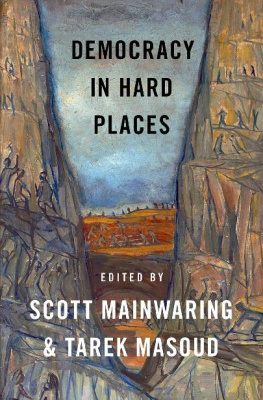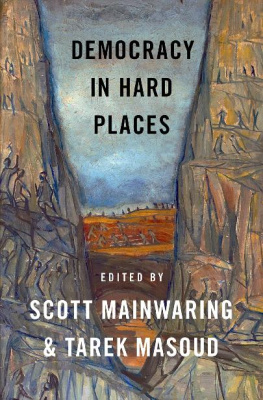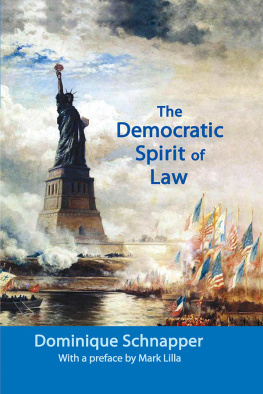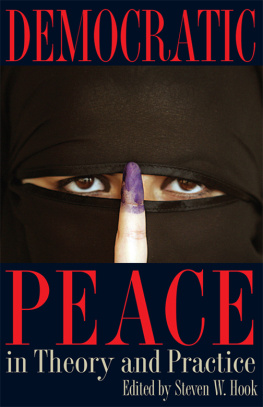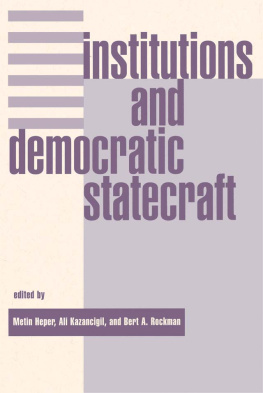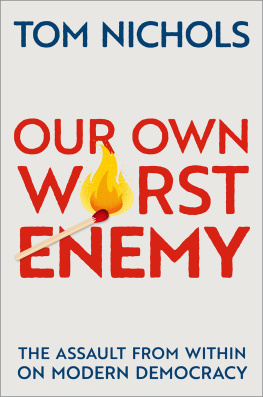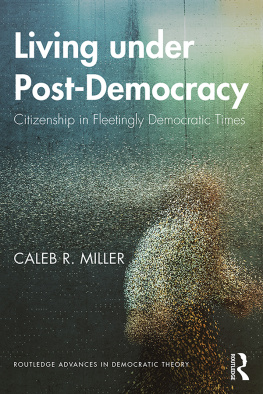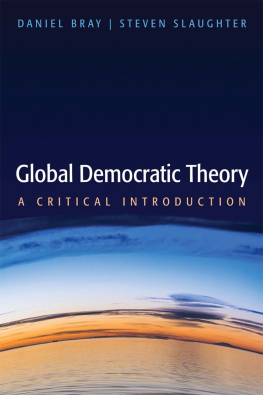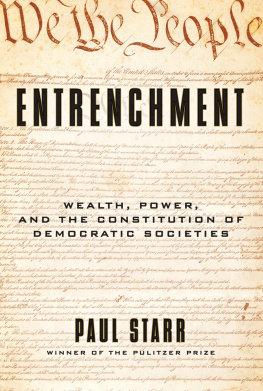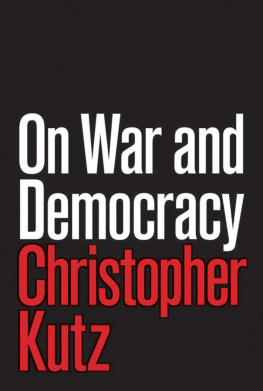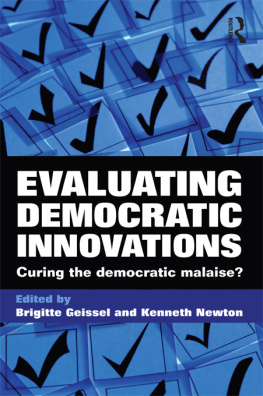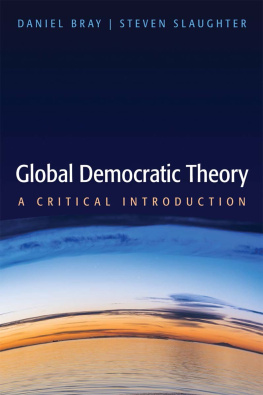Democracy in Hard Places
Democracy in Hard Places
Edited by
SCOTT MAINWARING AND TAREK MASOUD
Oxford University Press is a department of the University of Oxford. It furthers the Universitys objective of excellence in research, scholarship, and education by publishing worldwide. Oxford is a registered trade mark of Oxford University Press in the UK and certain other countries.
Published in the United States of America by Oxford University Press
198 Madison Avenue, New York, NY 10016, United States of America.
Oxford University Press 2022
All rights reserved. No part of this publication may be reproduced, stored in a retrieval system, or transmitted, in any form or by any means, without the prior permission in writing of Oxford University Press, or as expressly permitted by law, by license, or under terms agreed with the appropriate reproduction rights organization. Inquiries concerning reproduction outside the scope of the above should be sent to the Rights Department, Oxford University Press, at the address above.
You must not circulate this work in any other form and you must impose this same condition on any acquirer.
Library of Congress Cataloging-in-Publication Data
Names: Mainwaring, Scott, 1954 editor. | Masoud, Tarek E., editor.
Title: Democracy in hard places / [edited by] Scott Mainwaring, Tarek Masoud.
Description: New York, NY : Oxford University Press, 2022. |
Includes bibliographical references and index.
Identifiers: LCCN 2022006297 (print) | LCCN 2022006298 (ebook) |
ISBN 9780197598764 (paperback) | ISBN 9780197598757 (hardback) |
ISBN 9780197598788 (epub)
Subjects: LCSH: DemocracyCase studies. | DemocratizationCase studies. |
World politics21st centuryCase studies.
Classification: LCC JC423 .D381319 2022 (print) | LCC JC423 (ebook) |
DDC 321.8dc23/eng/20220322
LC record available at https://lccn.loc.gov/2022006297
LC ebook record available at https://lccn.loc.gov/2022006298
DOI: 10.1093/oso/9780197598757.001.0001
Contents
Tarek Masoud and Scott Mainwaring
Ashutosh Varshney
Dan Slater
Rachel Beatty Riedl
Lucan Ahmad Way
Nancy Bermeo
Scott Mainwaring and Emilia Simison
Scott Mainwaring
This book is about why democracy sometimes survives for a long time in difficult conditions. When we began planning the conference that led to the book, the COVID-19 pandemic and the January 6 insurrection at the United States Capitol would have been unthinkable to all but the most determined pessimists, but it was already a time of grave worry about the state of democracy in the world. We hope that this book not only enriches our understanding of what makes democracy in hard places possible, but also that it might inspire belief during these hard times that democracy can persist in the face of grave challenges.
The idea for this volume grew out of many conversations we had from 2016 to 2019 at Harvard University. We had neighboring offices, co-taught a course on Getting and Keeping Democracy in 2017 and in 2018 at Harvards John F. Kennedy School of Government, and co-directed a program on Democracy in Hard Places at the Kennedy Schools Ash Center for Democratic Governance and Innovation. During these years of working together, we often disagreed with one anotherbut in so doing, we always pushed each other to new understandings and insights. We also accrued a number of debts that we are pleased to acknowledge here.
Our first debt is to Tony Saich, the director of the Ash Center. Tony and the Center generously supported our work from the beginning. This support made possible the eponymous conference in May 2019 that gave rise to this book, and also enabled us to secure the editorial and administrative assistance necessary to bring the book to fruition. Special thanks must be rendered to Melissa DAnello and Maureen Griffin of the Ash Center, without whom neither the conference nor the book would have happened. We also thank our assistants at the Kennedy School, Juanne Zhao and Sari Betancourt.
Our debts were not just financial and administrative, but intellectual. We, and the contributors to this volume, were fortunate to benefit from the insights of an outstanding group of commentators and participants in the May 2019 conference on Democracy in Hard Places, including Eva Bellin, Fernando Bizzarro, Melani Cammett, Timothy Colton, Steven Fish, Candelaria Garay, Frances Hagopian, Sarah Hummel, Steven Levitsky, Pia Raffler, and Deborah Yashar. We are also grateful to Harvard colleagues Daniel Ziblatt, Richard Zeckhauser, Gautam Nair, Moshik Temkin, Alex Keyssar, and Archon Fung for informal conversations that shaped our thinking about democracy and its survival. Ashutosh Varshney, the author of the chapter on India, deserves special thanks for being an invigorating intellectual presence at the Ash Center during a critical phase of this books development.
We thank David McBride of Oxford University Press for his enthusiastic support for the project from the outset. And we record our thanks to Mara Victoria De Negri who, with characteristic talent and attention to detail, prepared the book for publication and compiled the index. Fernando Bizzarro provided helpful research.
Finally, Scott thanks his wonderful partner, Sue Elfin, for gracing his life. Tarek thanks his long-suffering partner, Kristin Alcorn Masoud, for tolerating his frequent failures to bring grace to hers.
The authors dedicate this book to the memory of Alfred C. Stepan, whose fingerprints are on every chapter.
Nancy Bermeo (PhD Yale University) is currently a Nuffield Senior Research Fellow at Oxford University and a PIIRS Senior Scholar at Princeton University. She writes on the causes and consequences of political mobilization and regime change as well as the quality of democracy. Her books include an award-winning study of the breakdown of democracy titled Ordinary People in Extraordinary Times (Princeton University Press), and, with Deborah Yashar, Parties, Movements and Democracy in the Developing World (Cambridge University Press), plus Mass Politics in Tough Times with Larry Bartels (Oxford University Press), and Coping with Crisis: Government Reactions to the Great Recession with Jonas Pontusson (Russell Sage Foundation). Her latest book, Democracy after War , is forthcoming from Princeton University Press.
Scott Mainwaring (PhD, Stanford) is the Conley Professor of Political Science at the University of Notre Dame. His research and teaching focus on democratization, party systems, and Latin American politics. His book with Anbal Prez-Lin, Democracies and Dictatorships in Latin America: Emergence, Survival, and Fall (Cambridge University Press, 2013) won the Best Book Prizes of the Democracy and Autocracy section of the American Political Science Association and the Political Institutions section of the Latin American Studies Association. Mainwaring was elected to the American Academy of Arts and Sciences in 2010. In April 2019, PS: Political Science and Politics listed him as one of the fifty most cited political scientists in the world. He served as the Jorge Paulo Lemann Professor for Brazil Studies and as faculty co-chair of the Brazil Studies program at Harvard University from 2016 to 2019.
Tarek Masoud (PhD Yale University) is the Ford Foundation Professor of Democracy and Governance at Harvard Universitys John F. Kennedy School of Government. He is the co-Editor of the Journal of Democracy , the director of the Kennedy Schools Middle East Initiative, the Initiative on Democracy in Hard Places, and the co-author of, among other works, The Arab Spring: Pathways of Repression and Reform (Oxford University Press, 2015).

